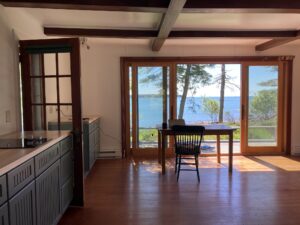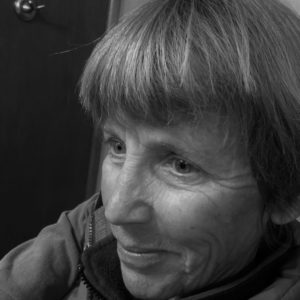 Here, two big winter storms brought a few trees down. The grass is lush and the ferns my mother planted have grown in and spread along the new drainage ditch. The place looks cared for, as my parents used to care for it. The driveway has a fresh load of gravel and the house a new coat of paint. I got here last night and even in the dark I could sense the changes wrought by time and weather and us, my sisters and brothers and me, who have a long relationship with this particular three acres. This is our home spot on the long coast of Maine, and it’s here we return every summer to sit down together in an old familiar place.
Here, two big winter storms brought a few trees down. The grass is lush and the ferns my mother planted have grown in and spread along the new drainage ditch. The place looks cared for, as my parents used to care for it. The driveway has a fresh load of gravel and the house a new coat of paint. I got here last night and even in the dark I could sense the changes wrought by time and weather and us, my sisters and brothers and me, who have a long relationship with this particular three acres. This is our home spot on the long coast of Maine, and it’s here we return every summer to sit down together in an old familiar place.
The morning after I arrive, the first thing I do is open every window and door to let the sea air in. Then I cut a bouquet of rosa rugosa and sweet fern for the center of the kitchen table. I notice where the deer have been bedding down and I notice—this is a rare sighting—bear scat in the driveway, a pile as big as my two spread hands. The fellow has been feasting on berries and recently came to pay a visit. Gulls and one bald eagle pass overhead. Below me, riding the ocean swells, loons, eiders, a pair of adventuresome mallards.
Here on the granite coast the rocks clatter as the tide pulls everything with it, out and in, in and out. Flynns Ledge, just off the shore southeast of the house, seems to rise and fall, draped with seaweed, looking like a woolly mammoth at low tide, then barely a scratch above the surface at high. Captain Stanley, who knew these waters better than anyone, rode up on the ledge in his old lobster boat the summer before he died. He and his wife Marion, headed to Bass Harbor to pay a visit to a friend, must have cut the corner too quickly, though he swore against it. Had to wait until evening for the tide to lift him off the rock. Word went out (no doubt beginning with him) that the ledge itself had made a shift in the last few years, walked a hundred yards east by some miracle. Someone in the crowd mentioned the words climate change.
This used to be a sleepy part of the world, undiscovered by people who rejoice in discovering. Now we share it with other humans, as well as many deer and turkey and a bear or two. The gulls still call back and forth like wind-up machines cranked over and over again. The eagle still flies overhead at five in the afternoon. This consistency is what creates ritual, a fancy name for what can be counted on to bring peace to a body and mind. Summer is the time for this kind of ritual, when the land shows itself, and its occupants step out from their burrows and dens or return from their southern exploits along the age-old migration paths. These paths and patterns give lie to the fact that we inhabit only one place, one life, one season.
Home is a portable notion. It hides and reappears, looks white in the winter, green in the summer, and full of every bright color in spring and fall. It throws a memory at you. You pick up a cup or a dish with a pattern of violets on it, and you’re home. Your hand feels along a crevice on a ledge above a river, and in that tactile knowledge you’re home. You sit at a table with faces familiar in all the possible ways of kin, and across the centerpiece of roses and sweet fern picked just that morning, you’re home.
At the post office, the stooped walk of those for whom a year older is more than that, who measure time in minutes and greetings and cups of tea overlooking the harbor—these are the geographical markers of home. The broad Downeast accents, like an earful of fecund earth, a garden ready to grow. The arthritic fingers of the postmistress. I would recognize those hands anywhere. Package for you, and across the counter flies a box of something that now seems irrelevant. I pack it under my arm and head out into the salted air, nodding hello at patrons whose home I borrow for a few weeks a year, and though they might frown were I to call it my own, they tolerate me.
Home, it is said, is a place in the heart. Never mind the poetry, or the notion of place or heart. Home is an effort made, a relationship sustained, a marriage discovered after years of sitting still. It’s the rhythm of the tides and the stories told. Home is on the tongue and in the lungs and, if it must be, in our imprecise rendering of that thing in our chest that throbs with pleasure and equally with pain.
The view changes with every storm. Trees come down and the ground, too, will disappear as the ocean decides what stays and what goes. It will chew away these three acres of fern and roses and tall grass. It will take the house. The bear will go, the eagle will fly in a different direction. Someone will come across what’s left of an old foundation, a chunk of it visible at low tide. What a strange place for a house, they’ll think. It must have picked up and walked right into the sea.
To be home is to be willing to relinquish it all, to walk without burden into the arms of the next place called home.

